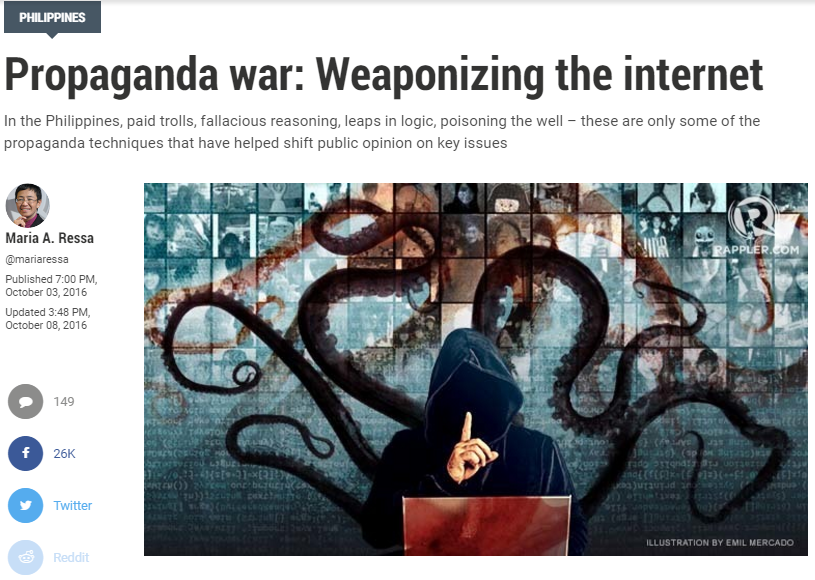Documenting Social Media Abuse

Screengrab from Rappler.
CHEERS TO Rappler for its investigation of the fake social media accounts, trolls and bogus sites during the elections and its application as propaganda afterwards. The misuse and abuse of the social media for political purposes affects the quality of democratic discourse about public issues and concerns.
Rappler posted the series early this month. In “Propaganda war: Weaponizing the internet” (Oct. 3), Maria Ressa wrote on the disinformation that has deluged the social media and the propaganda campaign favoring President Duterte. Ressa cited as example a dubious news site’s reposting of an old Rappler article on the arrest of a man with a bomb in Davao immediately after the bombing in that city on Sept. 3. The reposted article trended, spreading misinformation that the culprit of the recent bombing had been captured and that the administration’s declaration of a state of lawless violence was justified.
The piece also discussed bots (programs created to give automated response) and fake accounts, and how these played a vital role in the 2016 national elections. These also launched hate campaigns against critics of Duterte; later pivoting to an attack of mainstream media after the polls.
“How Facebook algorithms impact democracy” (Oct. 8) discussed the application of the fake accounts, bots, and anonymous pages and sites as political propaganda – first to promote a candidate and second, to attack opposing views. This part explained how Facebook algorithms decide what people see on their social media feeds, showing how this could lead to the misuse or abuse of internet freedom, especially during elections.
The piece noted that the phenomenon is not unique experience to the Philippines. As the US election season heated up, Facebook and other social media sites have also been used to spread disinformation, attack certain candidates and to praise others.
The third piece, “Fake accounts, manufactured reality on social media” (Oct. 9), concentrated on fake social media accounts. Written by Chay Hofileña, the piece discussed the role of these accounts in online interaction, presenting seemingly genuine opinion on issues when these are actually manufactured.
The article noted some patterns about these fake accounts: the use of profile photos of celebrities or “sexy-looking persons,” gardens or scenery as cover photos, and the supposed account holder’s having less than 50 friends. It included several examples of fake profiles of persons who claimed to be affiliated with ABS-CBN.
The Rappler pieces succeeded in simplifying the technical, using and explaining terms that are easily understood, making the complex issue comprehensible to the public. The three-part series detailed the insidious use of social media, presenting false narratives and attacking and silencing opposing views.
“Social media by itself can be empowering for the disadvantaged and those without access to mainstream media,” Hofileña wrote. Indeed the emergence of social media as an efficient platform to spread even disinformation and hate speech calls for vigilance about its abuse and a greater responsibility in its use. Its manipulation raises questions about its reliability as a source of news and information.
Leave a Reply